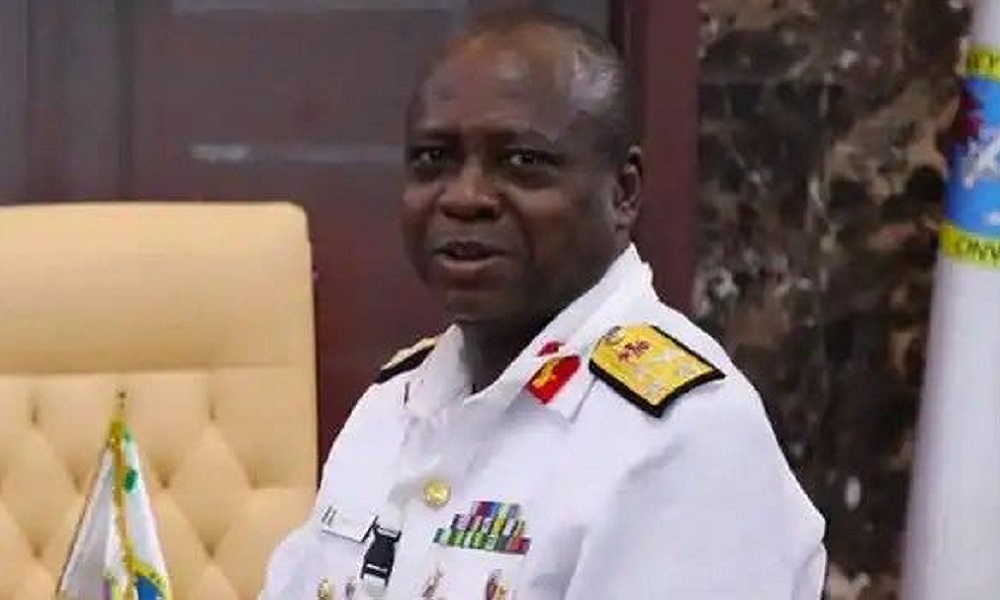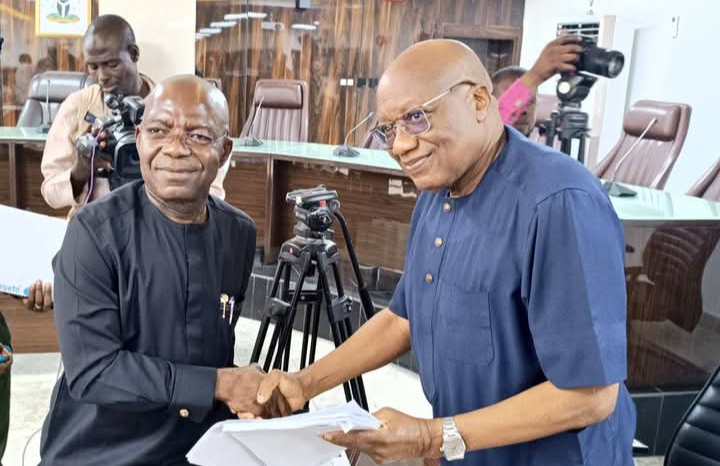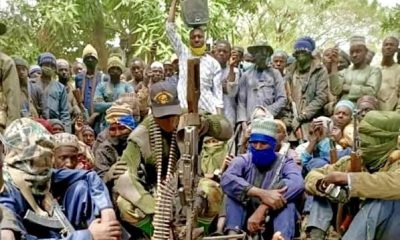News
4, 606 suspects arrested for maritime crimes – Chief of the Naval Staff

Chief of the Naval Staff, Vice Admiral Emmanuel Ogalla, on friday stated that limited community support makes maritime criminals emboldened, knowing that they may not be reported or caught in Nigeria
Despite this, the Naval Chief disclosed that about “4, 606 suspects have been arrested for various maritime crimes between 2015 and 2024” adding that the arrests were carried out “in the communities within the riverine areas”.
Vice Admiral Ogalla stated this while presenting the 3rd Distinguished personality lecture at Institute for Peace and Strategic Studies (IPSS), University of Ibadan on the lecture “Role of the Nigerian Navy in Combatting Maritime Crimes for enhanced Blue Economy in Nigeria”
While saying that the Navy has demonstrated a strong commitment to ensuring a secure environment necessary for the development for the blue economy, the Chief of the Naval Staff disclosed that the Navy is already pushing for the power to prosecute offenders in the core areas of its mandates.
According to him, “some community leaders justify the criminal behaviour of these criminals. This complicates maritime law enforcement efforts and poses a significant challenge to maritime security. it also underscores the urgent need for comprehensive, society-wide solutions to address root causes of maritime criminality, which threatens the successful exploitation of Blue economy potentials in Nigeria”
He then called for the establishment of special courts dedicated to maritime crimes to ensure effective and efficient justice delivery, ultimately resulting in better outcomes for law enforcement.
“The speedy prosecution of maritime crimes will improve data collection and analysis which are crucial for policy and legislative formulation in combating maritime crimes, for the development of the blue economy.”
While noting that transportation along the waterways generates approximately $1.2billion, the Naval Chief however noted that the evolving “dynamics of maritime crimes could negatively affect the prospects, hence the need for pragmatic solutions to address the threats”
While listing non-diligent prosecution of maritime crimes as one of the challenges facing the navy in combating maritime crimes, Vice Admiral Ogalla stated that “the Nigerian Navy and other law enforcement agencies have made commendable efforts in arrest and prosecution of maritime offenders. However, inadequacies such as prolonged trial periods are being exploited by criminals.
This has led to protracted litigation and several abandoned vessels across Nigerian Navy Bases. Between 2015 to date, 250 vessels arrested were handed over to prosecuting agencies, yet only 82 have been successfully prosecuted, leaving a balance of 168 still in Nigerian Navy custody In the last six years, the Nigerian Navy has lost a significant number of cases for non-diligent prosecution of maritime suspects by these prosecuting agencies.
Likewise, over N450 million for legal services are provided for these private lawyers at the expense of essential infrastructure for the service to combat the maritime crimes”.
“These waterways provide vital access to 28 of Nigeria’s 36 states and connect 6 neighbouring countries. Nigeria’s maritime domain also has the most fertile hydrocarbon provinces in the world, underscoring its strategic importance”
In its welcome address, the Vice Chancellor, University of Ibadan Professor Kayode Adebowale represented by the Deputy Vice Chancellor Administration, Professor Peter Olapegba stated that “a secure maritime domain is essential for the protection of our territorial integrity, the safeguarding of our economic interests, and the well-being of the millions of Nigerians who depend on the sea for their livelihoods.
As strategic hub for knowledge creation and re-creation in cognate areas of peace, security and humanitarian studies, we are particularly concerned about the rise in maritime threats, including, oil theft, illegal fishing, trafficking of drugs and weapons and piracy in particular. These illicit activities not only undermine our national security but also command potential to stifle economic growth and development along our coasts”
The director, Institute for Peace and Strategic Studies, Professor Ruth Adio-Moses maintained that the significance of “maritime security cannot be overstated, especially for a nation like ours blessed with a vast coastline and abundant maritime resources adding that the Chief of the Naval Staff was invited as part of the ongoing town-gown synergy towards proffering solutions to the myriads of problems facing the maritime space.”
News
Just in: Sam Olumekun takes over as INEC’s Acting Chairman

Mr. Sam Olumekun has taken over at the Independent National Electoral Commission (INEC) as Acting Chairman.
Olumekun is INEC’s National Commissioner in charge of Information and Voter Education.
He performed his first duties today, receiving a high-level delegation of the Labour Party (LP) at the Commission’s headquarters in Abuja with other National Commissioners in attendance.
The delegation was led by Abia State Governor Dr. Alex Otti, who visited the Commission to discuss key developments within the Labour Party.
It was gathered that both parties engaged in discussions centered on enhancing collaboration and reinforcing democratic values.
During the visit, Governor Otti formally presented a Certified True Copy of the recent Supreme Court judgment concerning the party’s leadership.
He noted that the meeting was aimed at fostering clarity, mutual understanding, and institutional alignment regarding the Labour Party’s current structure.
Mr. Olumekun, the Acting INEC Chairman, reaffirmed the Commission’s unwavering commitment to neutrality, transparency, and the rule of law in the discharge of its constitutional responsibilities.
Recall that a viral WhatsApp message had indicated that Prof. Mahmood was sacked by President Bola Tinubu and replaced with one Prof. Bashiru Olamilekan.
“INEC Chairman Prof. Mahmud Yakubu has been replaced with Prof. Bashiru Olamilekan by President Tinubu,” the message, which had no attribution, read. However, both INEC and the Presidency debunked the widespread report.
Yakubu, who is rounding off his second tenure in office, is expected to exit the system towards the end of this year.
The process of appointing an INEC chairman is the President nominating a candidate and forwarding his particulars to the Department of State Services (DSS) for profiling.
After such screening, the President, thereafter, takes the name to the National Council of State for its advisory review.
Based on the outcome, the President sends the name to the Senate for screening and confirmation.
News
Crude oil prices slide further, now selling below $57

Crude oil prices have dropped below $57, following a previous rate of $59.78.
This decline coincides with the imposition of tariffs on several countries by US President Donald Trump.
A report from West Texas Intermediate attributes this price slump to consistent 6% reductions observed last week.
JPMorgan Chase & Co has warned that these tariffs could likely push both the US and global economies into a recession this year.
The financial institution explained that the tariffs, set to take effect this week, are expected to have widespread economic repercussions.
Market analysts and the business community have expressed concerns about the negative implications of these measures, predicting a slowdown in economic activities and a subsequent decline in oil demand.
News
Niger Republic Junta Abandons French, Adopts Hausa As New Official Language

The military government of Niger has continued its efforts to cut ties with France.
In its latest move, it has officially designated Hausa as the country’s new national language.
Previously, French had served as the central and official language of the nation.
This new development was announced in a charter released on March 31 and published in a special edition of the government’s official journal.
According to the document, the national language is Hausa,” while “the working languages are English and French.”
Before this announcement, Hausa was already widely spoken in Niger, particularly in regions such as Zinder, Maradi, and Tahoua.
Out of the country’s estimated population of 26 million, the vast majority speak and understand Hausa.
In contrast, only around three million people— roughly 13 percent — can speak French.
The new charter also recognises nine other local languages, including Zarma-Songhay, Fula, Kanuri, Gourmanche, and Arabic, as “spoken languages of Niger.”
Additionally, the government has withdrawn from the Organisation Internationale de la Francophonie, a group similar to the Commonwealth that supports French-speaking nations.
In January, French President Emmanuel Macron criticised African leaders for what he described as a lack of gratitude.
Speaking about developments in the region, Macron said: “We had a relationship based on security — it was twofold. On one hand, it was our commitment to fighting terrorism since 2013. We were right, though I think someone forgot to say thank you. It’s okay, it will come with time.
“Ungratefulness, I know too well, is a disease that cannot be transmitted to men. But I say this for all African heads of state who have lacked courage in the face of public opinion.”
“None of them would be sovereign countries today if the French army hadn’t been deployed in the region. My heart goes out to all our soldiers, some of whom have given their lives and fought for years.”
“We did the right thing. We left because there were coups. We were there at the request of sovereign states who asked France to come.”
“From the moment there were coups and the people stated their objectives no longer involved fighting terrorism — or were unclear— France no longer had a place there.”
It’s worth recalling that in December 2023, Niger Republic officially expelled French troops from the country.
-

 News20 hours ago
News20 hours agoOERAF held memorial lecture on conflict resolution, security/safety of community in Nigeria
-

 News6 hours ago
News6 hours agoUS revokes more than 500 foreign student visas
-

 News20 hours ago
News20 hours agoHoR Minority Caucus decries killings in Plateau, Benue states, urges immediate presidential decisive actions
-

 News8 hours ago
News8 hours agoIbas picks administrators for 23 Rivers LGs(SEE list)
-

 News13 hours ago
News13 hours agoBandits have seized control of 64 communities in Plateau – Gov Muftwang
-

 News5 hours ago
News5 hours agoBanditry:” I was chained for 32days while in their den, killed my wife as I watch-Nat’l Assembly DD narrates experience
-

 Economy12 hours ago
Economy12 hours agoMobile Money transactions hit $1.68trn in one year
-

 News8 hours ago
News8 hours agoSAD! Roof Collapses At Nightclub Kills 44, Including province Gov






